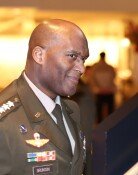Seoul wary of U.S.-N. Korea talks
Seoul wary of U.S.-N. Korea talks
Posted October. 23, 2000 12:51,
The Seoul government is watching U.S. Secretary of State Madeline Albright's visit to North Korea with expectations and concerns.
Its expectation is to see that, if Washington's economic sanctions are lifted, the inter-Korean economic cooperation will be facilitated with the North's obtaining loans from international financial organizations.
In addition, the establishment of liaison offices in their respective capitals and other substantial progress in the Pyongyang-Washington relations could be instrumental for the two Koreas to take the similar steps.
The Seoul government's apprehension is that the rapid development in North Korea-U.S. relationship could put off the schedules for inter-Korean collaboration. Some quarters expressed concern that Pyongyang would be bent on the improvement of its relations with Washington for winning U.S. guarantees to its security, ruling structure and economic development, which is feared to return the current inter-Korean situation to the days before the June 15 summit between the two Koreas.
If and when the North concentrates its effort on the improvement of its ties with the United States, taking advantage of Albright's visit to North Korea, Seoul's policy goals of concluding a peace mechanism on the Korean peninsula and other inter-Korean programs could hit a snag. In the Standing Committee meeting of the National Security Council on Oct. 18, the conferees discussed such a possibility, it was learned.
The South Korean government is discussing various ways of pushing ahead with the agreed programs with the North, but Pyongyang has so far failed to give a clear-cut response to the South. The Korean National Red Cross sent its presidential letter's to Pyongyang on Oct. 19, but it has yet to receive a reply.
In this regard, voices are being raised that if the North has adopted a two-pronged policy of engaging with both Seoul and Washington, it matters little, but that if the North has shifted its diplomatic course to only Washington, now that it earned all economic gains from the South, it is a matter of grave concern.
However, related government officials observed that the reason that Pyongyang is making haste to improve ties with Washington by sending special envoy Jo Myong-Rok might have stemmed from its concern that the Republican Party would win in the U.S. presidential election in November. They added that it is necessary for the Seoul government to wait patiently for the outcome of the ongoing U.S.-North Korea rapprochement process.
Experts predicted that the South-North and U.S.-North Korea relations will be developed at almost the same pace in the long run, despite Albright's diplomatic junket.
Lee Chong-Suk, a fellow of the Sejong Institute, forecast that Pyongyang is devoted to the impending issues revolving around the current visit by Albright and President Bill Clinton's expected Pyongyang trip, mainly due to its shortage of internal manpower concern that if the ongoing eventful diplomatic functions with the United States progress, the pending inter-Korean programs would regain their place.







